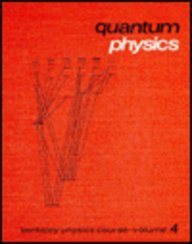Quantum Physics (Berkeley Physics Course, Volume 4) ebook
Par skinner dorothy le samedi, mai 14 2016, 20:51 - Lien permanent
Quantum Physics (Berkeley Physics Course, Volume 4) by Eyvind H. Wichmann


Quantum Physics (Berkeley Physics Course, Volume 4) book download
Quantum Physics (Berkeley Physics Course, Volume 4) Eyvind H. Wichmann ebook
Publisher: Mcgraw-Hill College
ISBN: 0070048614, 9780070048614
Format: djvu
Page: 423
Quantum Physics (Berkeley Physics Course, Volume 4) by Charles Kittel English | 1971 | ISBN: 0070048614 | 444 pages | PDF | 60 MB The course is being developed by an interuniversity group, of which Charles Kittel is chairman. But of course, the examiners insisted that I explain to them a whole chapter of the calculus book. The irish philosopher Berkeley denies at all the existence of the physical reality, and he consideres God as the direct cause of our perceptions: in a dream we can perceive material objects, but these perceptions are generated by .. If you are going to reject scientific theories because they fail to match up to your "common sense" it seems to me the place to start is here: Peter Woit: *Quantum Mechanics for Mathematicians* >**1.2 Basic axioms of quantum mechanics**… > **Axiom In the Copenhagan interpretation, this principle captures the physics of the collapse of the wave packet under measurement, which is not a process we understand. But two of the people who were hanging out in our midst that I enjoyed talking to the most were Nick Herbert and Jack Sarfatti because they liked to talk about the quantum physics and the possibilities of time travel. Edward Frenkel, http://math.berkeley.edu/~fren. Quantum physics tells us nothing about consciousness, and this fact tells us much about the nature of consciousness: it tells us that consciousness is not a physical process. Richard Taylor in his book Ethics, Faith, and Reason (pp.2-3). What really excited me was Quantum Physics. It came after (1) first name, (2) patronymic name, (3) last name, and (4) the date of birth. In my hometown, there weren't many Jews to begin with, and all of the purported discrimination cases my parents had heard of concerned programs in physics. Or consider Euclid, book I, proposition 36.